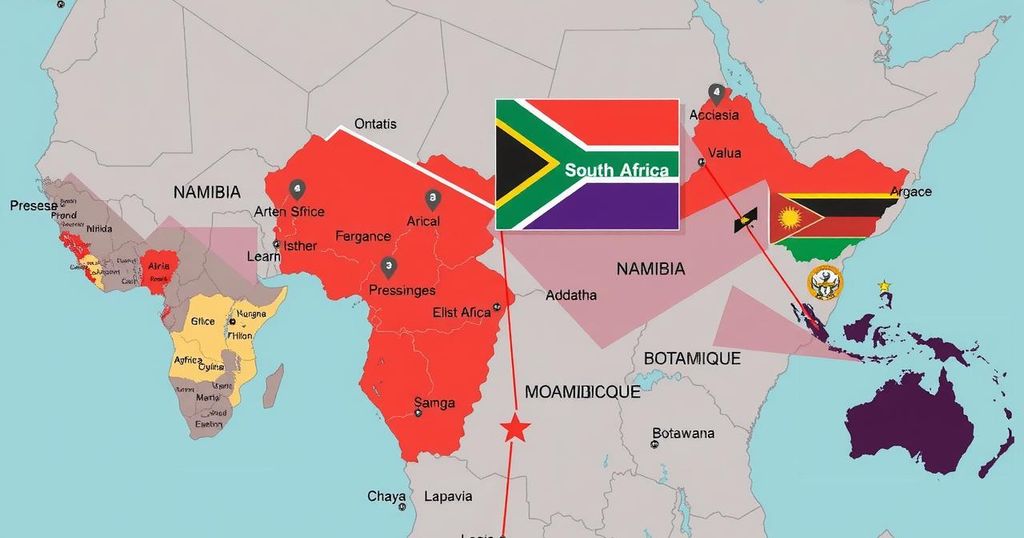The 2024 elections in Southern Africa showcase varying political dynamics, as traditional liberation parties face significant challenges amidst growing demands for reform. South Africa witnessed the ANC losing majority control, signaling potential change in governance. In Botswana, opposition success reflects public discontent with economic conditions, while Mozambique reveals turmoil despite Frelimo’s hold. Namibia remains resilient under SWAPO, yet the situation illustrates the complexity of political evolution in the region.
The political landscape in Southern Africa as evidenced by the 2024 election results in South Africa, Mozambique, Botswana, and Namibia showcases significant variations in the quest for political renewal within the region. Each country reflects distinct characteristics and challenges, moving beyond a generalized narrative of change. Observers note that the establishment of South Africa’s coalition government may signal a broader shift from the dominance of former liberation movements, which have historically governed the region. The fall of the African National Congress (ANC) below a majority threshold illustrates this evolving dynamic, hinting at the possibility of increasing fragmentation among political parties. In South Africa, factors such as economic disparities and dissatisfaction among the populace, particularly regarding the ANC’s governance, contributed to the rise of alternative parties, such as uMkhonto weSizwe, which aligned itself with Zulu nationalism to garner support among marginalized groups.
In stark contrast, Botswana’s political scenario revealed a shift away from the Botswana Democratic Party (BDP), which had a longstanding grip on power since independence. The recent elections saw the opposition, Umbrella for Democratic Change, winning a parliamentary majority, emphasizing the electorate’s frustrations regarding socio-economic challenges like unemployment and rampant inequality. President Duma Boko’s commitment to addressing these issues points toward a potential pivot in policy focus.
Mozambique’s situation, however, remains tumultuous, marked by allegations of electoral fraud and violence despite the continued dominance of the former liberation movement, Frelimo. The emergence of charismatic opposition leaders reflects a growing demand for political transformation. Meanwhile, Namibia’s elections reaffirmed SWAPO’s power, although the candidacy of a woman provided a surprising element in a traditionally patriarchal political landscape, continuing a trend of stability in the face of public dissatisfaction.
Overall, the Southern African region is witnessing a complex interplay between the historical legacy of liberation movements and the contemporary demands of a youthful, urbanized electorate seeking genuine political, economic, and social reforms. As dissatisfaction grows, ruling parties must grapple with the realization that their historical narratives may no longer resonate with a populace increasingly focused on pressing modern-day challenges.
The context of political renewal in Southern Africa is heavily influenced by historical trajectories related to liberation movements that once fought against colonialism and apartheid. Many Southern African nations, including South Africa, Botswana, Mozambique, and Namibia, have experienced similar political narratives dominated by parties that emerged from liberation struggles. However, societal conditions have evolved significantly over the years, with escalating economic challenges, youth discontent, and mounting inequalities urging voters to demand more accountability and change. Analyzing recent electoral outcomes reveals varying responses to these challenges across different countries, highlighting a potential shift in regional power dynamics as new political forces begin to emerge.
The recent elections in Southern Africa signify a pivotal moment in the political landscape, as the electorate increasingly demands accountability and reform from traditional ruling parties, primarily drawn from liberation movements. The rise of opposition forces and the election outcomes in countries like South Africa, Botswana, Mozambique, and Namibia depict a growing restlessness among citizens fueled by socio-economic grievances. As these electoral shifts unfold, they underline a broader regional trend towards political diversity and highlight the necessity for incumbent leaders to adapt to contemporary demands in order to maintain legitimacy.
Original Source: www.fairobserver.com






